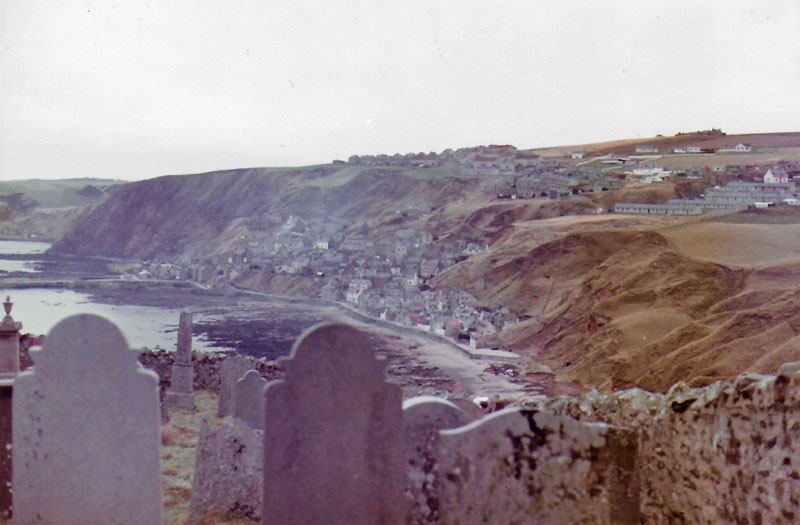[Click on BLUE links for sources and more information]
This is our 15th page of poems and napkin art. The other page links are listed below. At TITM we believe that poetry is more important than ever given The Way We Live Now. Poetry and art go together well. We have tried to match up poems we like with Napkin Art from the old Sea Gull Cellar Bar. We encourage you to read all the poems and enjoy the art !
I Taught Myself to Live Simply
Anna Akhmatova
I taught myself to live simply and wisely,
to look at the sky and pray to God,
and to wander long before evening
to tire my superfluous worries.
When the burdocks rustle in the ravine
and the yellow-red rowanberry cluster droops
I compose happy verses
about life’s decay, decay and beauty.
I come back. The fluffy cat
licks my palm, purrs so sweetly
and the fire flares bright
on the saw-mill turret by the lake.
Only the cry of a stork landing on the roof
occasionally breaks the silence.
If you knock on my door
I may not even hear.
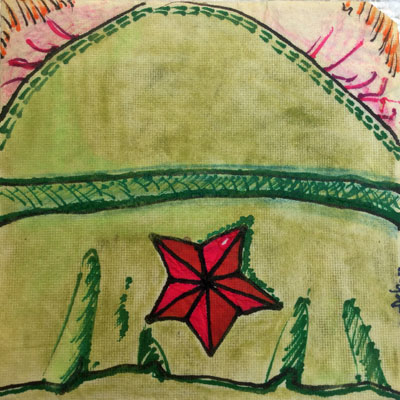
Sea Gull Cellar Bar Napkin Art, Deb artist
The Flower
Alexander Pushkin
Translated by: Genia Gurarie, summer of 1995
A flower – shrivelled, bare of fragrance,
Forgotten on a page – I see,
And instantly my soul awakens,
Filled with an aimless reverie:
When did it bloom? the last spring? earlier?
How long? Where was it plucked? By whom?
By foreign hands? or by familiar?
And why put here, as in a tomb?
To mark a tender meeting by it?
A parting with a precious one?
Or just a walk, alone and quiet,
In forests’ shade? in meadows’ sun?
Is she alive? Is he still with her?
Where is their haven at this hour?
Or did they both already wither,
Like this unfathomable flower?
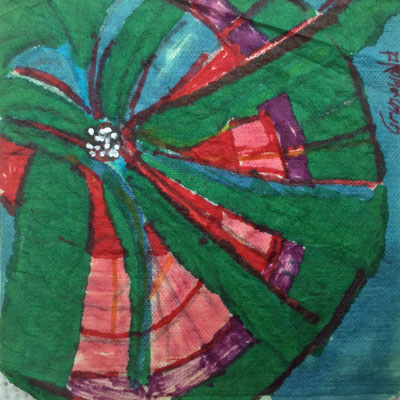
Sea Gull Cellar Bar Napkin Art, Estelle Grunewald
I Heard a Fly Buzz When I Died
Emily Dickinson
I heard a Fly buzz – when I died –
The Stillness in the Room
Was like the Stillness in the Air –
Between the Heaves of Storm –
The Eyes around – had wrung them dry –
And Breaths were gathering firm
For that last Onset – when the King
Be witnessed – in the Room –
I willed my Keepsakes – Signed away
What portion of me be
Assignable – and then it was
There interposed a Fly –
With Blue – uncertain – stumbling Buzz –
Between the light – and me –
And then the Windows failed – and then
I could not see to see –
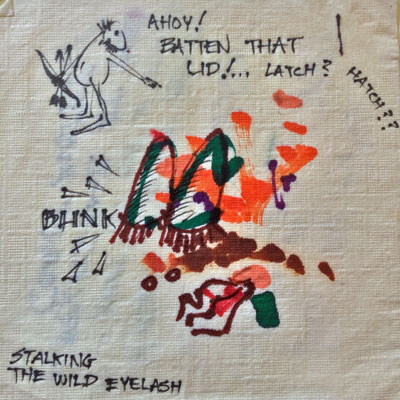
Sea Gull Cellar Bar Napkin Art, Max Efroym artist
Grandmother Eliza
Nora Marks Dauenhauer
My grandmother Eliza
was the family surgeon.
Her scalpel made from a pocketknife
she kept in a couple of pinches of snoose.
She saved my life by puncturing
my festering neck twice with her knife.
She saved my brother’s life twice
when his arm turned bad.
The second time she saved him
was when his shoulder turned bad.
She always made sure
she didn’t cut an artery.
She would feel around for days
finding the right spot to cut.
When a doctor found out s
he saved my brother’s life
he warned her,
“You know you could go to jail for this?”
Her intern, my Auntie Anny, saved my life
when I cut a vessel on my toe.
While my blood was squirting out
she went out into the night
and cut and chewed the bark
of plants she knew.
She put the granules of chewed up bark
on my toe before the eyes of the folks
who came to console my mother
because I was bleeding to death.
Grandma’s other intern, Auntie Jennie,
saved our uncle’s life when his son
shot him through the leg by accident.
A doctor warned her, too,
when he saw how she cured.
Her relative cured herself of diabetes.
Now, the doctors keep on asking,
“How did you cure yourself?”
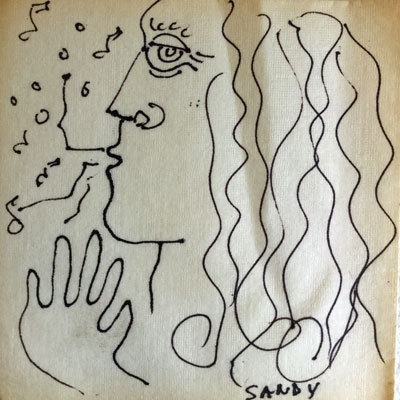
Sea Gull Cellar Bar Napkin Art, Sandy Parmer artist
The Hours Fly Quick
Quincy Troupe, 1939
the hours fly quick on wings of clipped winds
like nonsense blown from mouths of hot air—
people—including my own—form syllables, suds,
words shot through pursed lips like greased sleaze
& bloom inside all these rooms dominated by television’s
babble sluicing idiot images invented in modern test tubes— clones—blinking, slathering all over controlled airwaves
of an up-for-sale world, blinking a paucity of spirit,
so dance you leering ventriloquists, marionettes,
you greedy counterfeits, dance, dance, dance
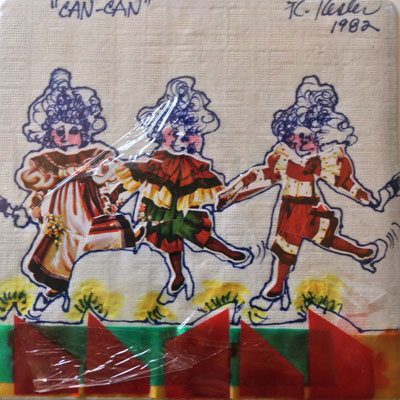
Sea Gull Cellar Bar Napkin Art, artist Karen Kesler
Political Greatness
Percy Bysshe Shelley
Nor happiness, nor majesty, nor fame,
Nor peace, nor strength, nor skill in arms or arts,
Shepherd those herds whom tyranny makes tame;
Verse echoes not one beating of their hearts,
History is but the shadow of their shame,
Art veils her glass, or from the pageant starts
As to oblivion their blind millions fleet,
Staining that Heaven with obscene imagery
Of their own likeness. What are numbers knit
By force or custom? Man who man would be,
Must rule the empire of himself; in it
Must be supreme, establishing his throne
On vanquished will, quelling the anarchy
Of hopes and fears, being himself alone.
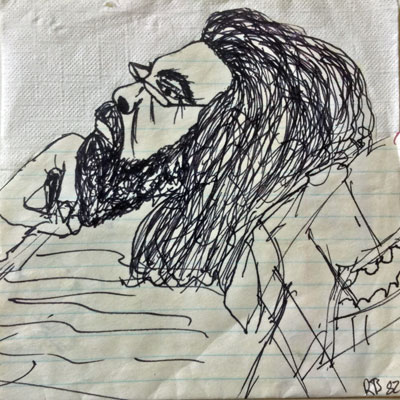
Sea Gull Cellar Bar Napkin Art, Bob Seaver artist
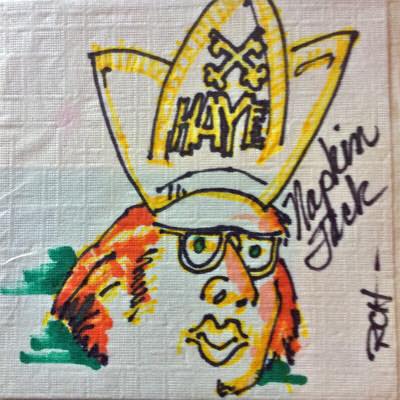
Sea Gull Cellar Bar Napkin Art, Roy Hoggard artist
Parable of the Madman
Friedrich Nietzsche
Have you not heard of that madman who lit a lantern in the bright morning
hours,
ran to the market place, and cried incessantly:
‘I seek God! I seek God!’
As many of those who did not believe in God
were standing around just then,
he provoked much laughter.
Has he got lost? asked one.
Did he lose his way like a child? asked another.
Or is he hiding?
Is he afraid of us? Has he gone on a voyage? emigrated?
Thus they yelled and laughed.
The madman jumped into their midst and pierced them with his eyes.
‘Whither is God?’ he cried; ‘I will tell you.
We have killed him–you and I.
All of us are his murderers.
But how did we do this?
How could we drink up the sea?
Who gave us the sponge to wipe away the entire horizon?
What were we doing when we unchained this earth from its sun?
Whither is it moving now? Whither are we moving?
Away from all suns?
Are we not plunging continually?
Backward, sideward, forward, in all directions?
Is there still any up or down?
Are we not straying, as through an infinite nothing?
Do we not feel the breath of empty space?
Has it not become colder? Is not night continually closing in on us?
Do we not need to light lanterns in the morning?
Do we hear nothing as yet of the noise of the gravediggers
who are burying God?
Do we smell nothing as yet of the divine decomposition?
Gods, too, decompose.
God is dead.
God remains dead.
And we have killed him.
‘How shall we comfort ourselves, the murderers of all murderers?
What was holiest and mightiest of all that the world has yet owned has bled
to death under our knives: who will wipe this blood off us?
What water is there for us to clean ourselves?
What festivals of atonement, what sacred gamesshall we have to invent?
Is not the greatness of this deed too great for us?
Must we ourselves not become gods simply to appear worthy of it?
There has never been a greater deed; and whoever is born after us –
For the sake of this deed he will belong to a higher history than all
history hitherto.’
Here the madman fell silent and looked again at his listeners;
and they, too, were silent and stared at him in astonishment.
At last he threw his lantern on the ground,
and it broke into pieces and went out.
‘I have come too early,’ he said then; ‘my time is not yet.
This tremendous event is still on its way, still wandering;
it has not yet reached the ears of men.
Lightning and thunder require time;
the light of the stars requires time;
deeds, though done, still require time to be seen and heard.
This deed is still more distant from them than most distant stars –
and yet they have done it themselves.
It has been related further that on the same day
the madman forced his way into several churches
and there struck up his requiem aeternam deo.
Led out and called to account, he is said always to have replied nothing
but:
‘What after all are these churches now
if they are not the tombs and sepulchers of God?’
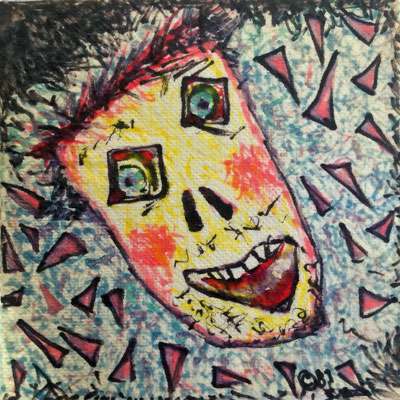
Sea Gull Cellar Bar Napkin Art, SS artist
Prints
Joseph Bruchac
Seeing photos
of ancestors
a century past
is like looking
at your own
fingerprints—
circles
and lines
you can’t
recognize
until someone else
with a stranger’s eye
looks close and says
that’s you.
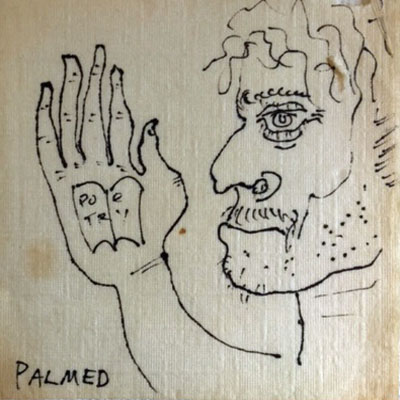
Sea Gull Cellar Bar Napkin Art, artist unknown
The Poem
Vladimir Nabokov
Not the sunset poem you make when you think
aloud,
with its linden tree in India ink
and the telegraph wires across its pink
cloud;
not the mirror in you and her delicate bare
shoulder still glimmering there;
not the lyrical click of a pocket rhyme—
the tiny music that tells the time;
and not the pennies and weights on those
evening papers piled up in the rain;
not the cacodemons of carnal pain;
not the things you can say so much better in plain prose—
but the poem that hurtles from heights unknown
—when you wait for the splash of the stone
deep below, and grope for your pen,
and then comes the shiver, and then—
in the tangle of sounds, the leopards of words,
the leaflike insects, the eye-spotted birds
fuse and form a silent, intense,
mimetic pattern of perfect sense.
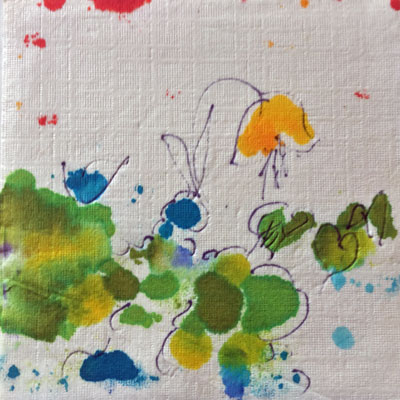
Sea Gull Cellar Bar Napkin Art, artist unknown
Cleanliness
Raymond Queneau
The little pigeons full of whimsicrap
used to come and go flying over Paris
giving its walls an exquisite shade
of avian poop grayish in tint
never suspecting poor innocents
that a devious plot waits for them below
now they are trapped!
they are not happy
adieu Paris! adieu my beautiful city
says the pigeon sent off to the country
I will no longer crap on your Hotel de Ville
I will no longer crap on your proud monuments
such sadness, I weep to think of it,
to waste such fine excrement
which could have buttered the homes
of my native city eating away at the cement
brick concrete marble flint
yes, cries the pigeon to himself, I am quite proud
my turds are virulent PH acid
adieu my beautiful Paris adieu my dear city
I leave for my exile in a paddy wagon
I will forever retain amidst the hicks
the indelible image of the charm of your streets
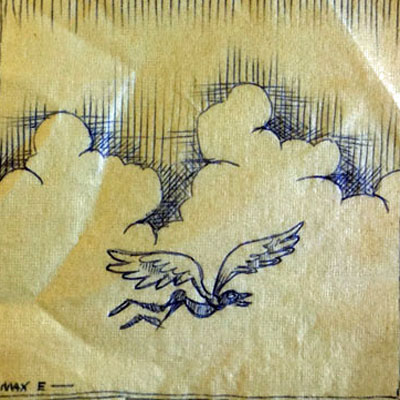
Sea Gull Cellar Bar Napkin Art, Max Efroym artist
Money
Philip Larkin
Quarterly, is it, money reproaches me:
‘Why do you let me lie here wastefully?
I am all you never had of goods and sex.
You could get them still by writing a few cheques.’
So I look at others, what they do with theirs:
They certainly don’t keep it upstairs.
By now they’ve a second house and car and wife:
Clearly money has something to do with life
—In fact, they’ve a lot in common, if you enquire:
You can’t put off being young until you retire,
And however you bank your screw, the money you save
Won’t in the end buy you more than a shave.
I listen to money singing. It’s like looking down
From long french windows at a provincial town,
The slums, the canal, the churches ornate and mad
In the evening sun. It is intensely sad.
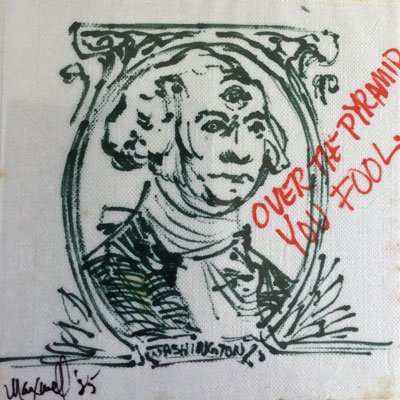
Sea Gull Cellar Bar Napkin Art, James Maxwell artist
To Rulers and Judges
Gavril Derzhavin
He’s risen – Highest God – to do the judgment, fair,
Of the earthly ones in their whole band;
How long – he sad – how long will you else spare
The unjust and wicked people in your land.
Your sacred duty is to make support for laws,
To make no favor to the strongest ones,
To leave the widows and orphans in your borders
Without help and safety not once.
To save the innocent from all that harm and wrong is,
To give good shelter to unhappy folks,
To shield the weak from evil of the strongest,
To drew the poor from their heavy bonds.
They don’t hear the words! They see and they don’t know
Their eyes are covered with a veil of bribes and wealth,
The black injustice shakes the havens’ dome,
And wicked deeds convulse the whole earth.
I thought, kings, you are strong as strong the gods of heavens,
And nobody else can judge you on the earth,
But you, like I, live in the yoke of passions,
And, just like I’m , are serfs of the Lord Death.
And you shall fall like leafs fall, that are withered,
From wet and bare trees by the autumnal sky!
And you will die, the great and wealthy caesar,
Just like your poorest slave will die!
Arise, at last, O God! God of the just and purest!
Hark to the prayers they recall with for your grace:
Come, judge, chastise the wicked worldly rulers,
And be the only king on Haven and the earth.
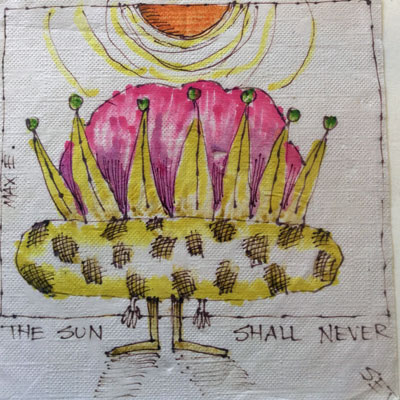
Sea Gull Cellar Bar Napkin Art, Max Efroym artist
Looking Back
Ursula Le Guin
Remember me before I was a heap of salt,
the laughing child who seldom did
as she was told or came when she was called,
the merry girl who became Lot’s bride,
the happy woman who loved her wicked city.
Do not remember me with pity.
I saw you plodding on ahead
into the desert of your pitiless faith.
Those springs are dry, that earth is dead.
I looked back, not forward, into death.
Forgiving rains dissolve me, and I come
still disobedient, still happy, home.
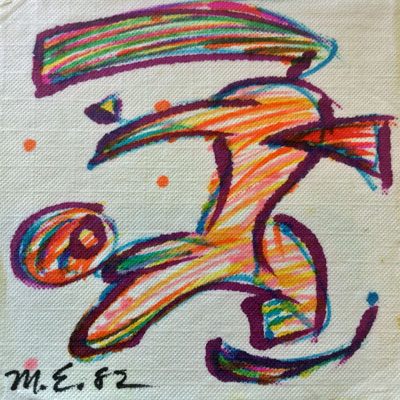
Sea Gull Cellar Bar Napkin Art, Mark Eanes artist
Dancing
Alma Flor Ada
Music fills the room
as we play.
Seven of us grow
taking up all the space
leaving only enough room
for a couple to dance
with quick steps her hair flying
in abandonment.
Two absorbed by our music
which continues to take over the world
everything else forgotten
unimportant
like scattered litter strewn
on the dance floor.
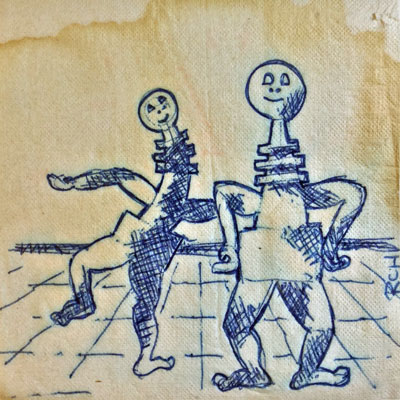
Sea Gull Cellar Bar Napkin Art, Roy Hoggard artist

